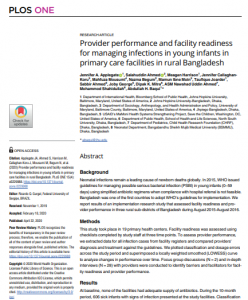
Background
Neonatal infections remain a leading cause of newborn deaths globally. In 2015, WHO issued guidelines for managing possible serious bacterial infection (PSBI) in young infants (0–59 days) using simplified antibiotic regimens when compliance with hospital referral is not feasible. Bangladesh was one of the first countries to adopt WHO’s guidelines for implementation. We report results of an implementation research study that assessed facility readiness and provider performance in three rural sub-districts of Bangladesh during August 2015 August 2016.
Methods
This study took place in 19 primary health centers. Facility readiness was assessed using checklists completed by study staff at three time points. To assess provider performance, we extracted data for all infection cases from facility registers and compared providers’ diagnosis and treatment against the guidelines. We plotted classification and dosage errors across the study period and superimposed a locally weighted smoothed (LOWESS) curve to analyze changes in performance over time. Focus group discussions (N = 2) and in-depth interviews (N = 28) with providers were conducted to identify barriers and facilitators for facility readiness and provider performance.